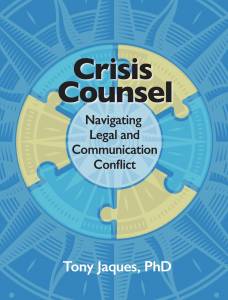How A CEO Apology Satisfied No-one and Ignored the Real Issue
The importance of reputation management and crisis communication when a CEO apologizes.
BY TONY JAQUES PHD, DIRECTOR OF ISSUE OUTCOMES PTY LTD, FOR PEOPLE WHO WORK IN ISSUE AND CRISIS MANAGEMENT, AUTHOR OF CRISIS COUNSEL: NAVIGATING LEGAL AND COMMUNICATION CONFLICT.
Can you apologise for what you said about a highly emotive controversy and still defend what caused the controversy in the first place? That’s the question for Netflix CEO Ted Sarandos after his company aired a show by comedian Dave Chappelle, which was regarded as homophobic and transphobic. Responding to outrage from Netflix staff, Sarandos penned a lengthy all-staff email in which he acknowledged that some had been left angry, disappointed and hurt by the Chappelle special.
Arguing for artistic freedom and programming for a diversity of taste, he said Netflix would always have titles that some members and employees dislike or believe are harmful. “Last year, we heard similar concerns about 365 Days and violence against women. While some employees disagree, we have a strong belief that content on screen doesn’t directly translate to real-world harm.”
He then defended the Chappelle special by touting the increasing diversity on Netflix, citing programs including the award-winning shows by Australian lesbian comic Hannah Gadsby.
Rather than calming the situation, the tone-deaf memo seemed only to heighten tension both within and outside the company. High-profile trans celebrities joined the protest, and Hannah Gadsby wrote an Instagram note addressed to Sarandos. “I would prefer if you didn’t drag my name into your mess.” She called Netflix an “amoral algorithm cult” and condemned Chappelle’s “emotionally stunted partial world view.”
Facing a staff walkout Sarandos then changed tack and decided to apologise to his staff. He told the Hollywood Reporter:
“I screwed up that communication in two ways. One of them was, I should have first and foremost acknowledged that a group of our employees were in pain, and they were really feeling hurt from a business decision that we made. And, instead of acknowledging that first, I went right into some rationales. So first of all, I’d say those emails lacked humanity, in which I like to, and I do generally, communicate with our teams.”
“I would say the other one was that — this is the problem when you have a leaked email out of context — it’s part of a conversation already in progress, and that line of not causing harm in the real world was way over-simplistic. Of course, content, storytelling causes change in the world, sometimes hugely positive and sometimes negative . . . So, it was just very clumsy, internal communication that went public.”
However, the CEO doubled down defending the Chappelle special, saying it was consistent with the Netflix comedy offering, consistent with Dave Chappelle’s comedy brand, and would not be changed or taken down.
In terms of reputation management, this crisis of the company’s own making has some key lessons from their CEO’s apology
- Don’t write “clumsy communication” you later need to recant. As the saying goes, keep your words sweet and tender as you may have to eat them one day.
- Acknowledging a mistake which caused pain was a good start, but it was unwise for the CEO to argue the style was “out of character” for him. A sincere apology is no place for self-praise
- Suggesting the original email was “leaked” and out of context is simply a cliché excuse which tries to minimize blame. Every employee communication should be written on the assumption it will likely be shared outside the organisation.
- Most importantly, the apology was completely misdirected. Employees were not angry about the imprudent email but about Netflix deciding to air such a program.
Bottom line, the mea culpa interview was largely an effort to justify a controversial decision. It satisfied no-one and reinforced that an ill-judged CEO apology sometimes truly is worse than no apology at all.
A Parting Thought
Never ruin an apology with an excuse.
Benjamin Franklin
Learn more about Reputation Risk, CEO apologies, and Crisis communication in Tony Jaques’ new book, Crisis Counsel: Navigating Legal and Communication Conflict.
“Crisis Counsel confirms Tony Jacques position as one of the industry’s foremost experts on issues and crisis management. In addressing the complex interactions between legal and communication crisis responses Dr. Jacques provides riveting case studies and practical advice. It highlights the financial and reputation risks of not effectively integrating communications and legal counsel. It should be on every communications practitioner’s reading list and companies should insist their in house and external legal counsellors read it.” – Noel Turnbull, Former Chair of Turnbull Porter Novelli, Adjunct Professor, RMIT University.
“Senior managers who find themselves in the C-suite for the first time, Crisis Counsel should be mandatory reading. Such specific legal and communications provocations are not covered in university management courses, and the introduction is replete with illuminating case studies and key takeaways. The author provides sage advice for Chief Executives who must ultimately make a decision based upon what they think is the right thing to do; often under pressure. Crisis team leaders and team members will find this book equally of value, as the more you know about it, the better you and the team will be.” – Jim Truscott, Director, Jim Truscott & Associates Pty Ltd, Perth, Australia
“For far too long, the role of lawyers in crisis management has been neglected. If discussed at all, it is often in negative terms. Tony Jaques adjusts this picture in masterly, yet eminently readable terms. His comprehensive discussion of apology in crisis management is likely to be a go-to source for years to come. This is a welcome book for anyone interested in how crisis-confronted corporations (and other organizations, too) can navigate the tricky legal waters of communicating under fire. For university teachers like me, it’s a rich source of well-researched case studies. A gem!” – Chris Galloway, PhD, Head of Pubic Relations, Massey University of New Zealand

